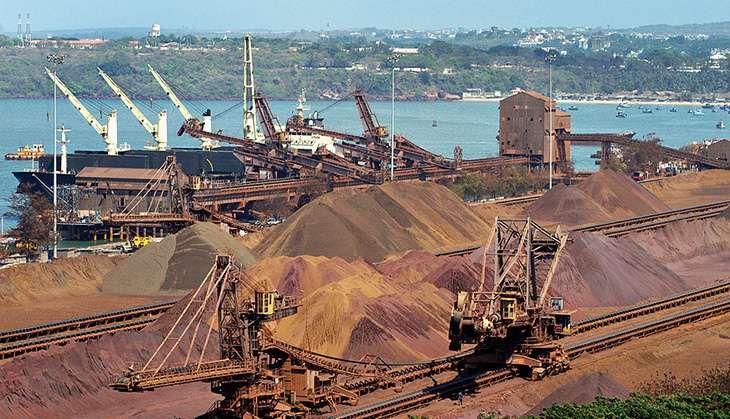
Image: Getty Images
Despite the initial excitement at Goa government’s decision to consider auctioning iron ore mining leases, Director of the Goa Foundation Claude Alvares told SabrangIndia on December 3, 2020 that he has had second thoughts about the benefits of the move.
“Initially, I had heard the auctioning was a done decision rather than a consideration. However, that aside, auctioning still does not guarantee the best price for the mineral resources,” said Alvarez.
The Goa Foundation is the most famous environmental action group in the state whose contribution to mining in terms of environmental litigation has been truly impressive. The group along with its Goenchi Mati Movement (GMM) has been fighting for the mining rights of state citizens for years arguing that such resources belong to the people of Goa and as such they should not be usurped by corporations.
Due to the long drawn out court battle over many years, Alvares knew that prices of iron ore could vary from Rs. 500 to Rs. 10,000 per tonne. Companies are well-trained in sitting on these resources to increase prices and create greater profit margins, said Alvares.
“Further, auctions as being considered by the state government could also bring in big companies that could bring the whole government under control,” said Alvares.
However, he conceded that auctioning is better than the earlier system of free of cost mining leases barring nominal fees. The group’s initial joy at the news also came from the fact that the former corporation, responsible for looting mineral resources, would not gain ownership of these leases. These corporations were formerly accused of illegal mining. Their mining activities and lease transfers were also thoroughly scrutinised by the Shah Commission of Inquiry.
The full report can be seen below:
https://drive.google.com/file/d/1vuhjEOk6EFMQFoVTwq3tWU61K08eAp8k/view?usp=sharing
Yet, the group stated that there were other loopholes in the mining system. Therefore, Alvares recommended extraction contracts rather than mining leases. During the Ore Chor! 144 campaign, the group stated that the system of mining leases resulted in the loss of over 95 percent of the value of Goan minerals.
“We will have a press conference on December 5 to talk to the Goa government. We will not allow any mining unless the money owed to Goan people is returned to Permanent Funds. The government should discuss such issues with citizens as well not just Union Ministers,” said Alvares.
He said that investment in Goa’s mining offers much better returns than thermal power projects which is why the profits of iron ore sales should directly go to the Iron Ore Permanent Fund – an endowment fund or a pension fund in which the money made from Goa’s iron ore can be deposited for the benefit of future generations. The Permanent Fund is unique to Goa following sanctions by the Supreme Court in 2014.
Along with the Fund, the group also demanded the creation of state mineral mineral corporations to keep the ores and its management subject to public scrutiny. Such a functioning body would also help mining labourers of Goa who are apprehensive of the possible auctioning of mining leases.
While Alvares asserted that mining Unions supported the group’s proposals, they feared new investors who would bring their own labourers to the mining site, rendering them jobless.
“Mining workers are demanding the return of the same people because they work on a lease-basis and stand to lose their jobs with new players in the field. If mineral corporations are set up this problem will also be solved because the group will absorb the workers,” he said.
Yet another member of the GMM Rahul Basu pointed out that the 88 iron ore mining leases are among a total of 277 mining leases in Goa. The state government hasn’t confirmed which leases they are considering auctioning, said Basu.
However, Alvares said that these old leases may become obsolete under the Minerals (Evidence of Mineral Contents) Rules, 2015. “The previous leases will no longer work because auctioning will now be done on the basis of mining blocks,” he explained.
The Goa Foundation hopes to ensure that mineral resources, like all other natural resources, belong to the people of Goa with the government as the custodian of this wealth. One of their persisting goals to cancel the illegal 88 mining leases, was already accomplished in 2017.
Now, the organisation is working towards the recovery of Rs.1,44,000 crores that the people of Goa were allegedly robbed off of during the illegal mining activities. They demand that the amount be deposited in the Iron Ore Permanent Fund and its interest after deducting inflation be distributed to all Goans as a Dividend.
“Basically, we want the use of natural resources carried out in a fair manner,” said Basu.
The Goa Foundation wants that the government accept the intergenerational equity principle adopted by other progressive countries who wish to hand over natural resources as inherited wealth to their children.
Related:
Goa government considers auctioning 88 halted iron ore mining leases
Withdraw virtual clearance given to two projects in Goa’s wildlife sanctuary: NAPM
Goa Lokayukta slams Governor for ignoring order to take action against errant officers